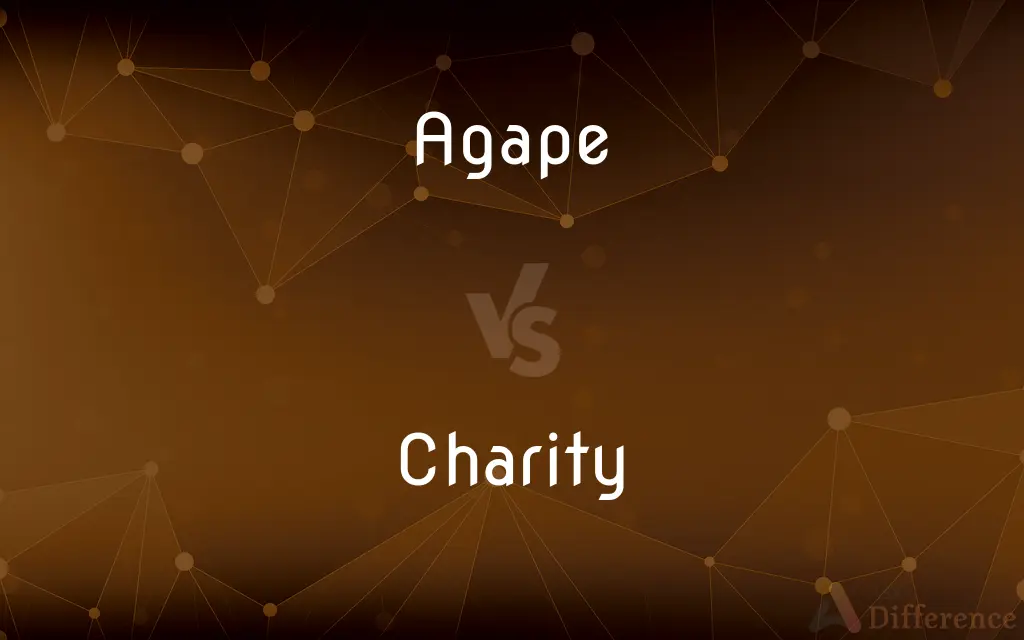Agape vs. Charity — What's the Difference?
By Tayyaba Rehman & Maham Liaqat — Updated on April 3, 2024
Agape is selfless, unconditional love, often associated with divine love in Christianity, while charity is the act of giving to those in need, reflecting love through generous actions.

Difference Between Agape and Charity
Table of Contents
ADVERTISEMENT
Key Differences
Agape, a term rooted in Christian theology, describes a form of love that is selfless, sacrificial, and unconditional, often regarded as the highest form of love, embodying God's infinite love for humanity. It transcends personal desires and expectations, focusing on the well-being and betterment of others without seeking anything in return. On the other hand, charity, traditionally one of the three theological virtues in Christianity, involves acts of giving and kindness towards those in need. It's a practical expression of love and compassion, demonstrating agape through tangible assistance and generosity towards others.
Agape emphasizes the love principle, highlighting the attitude and motive behind actions. It's about loving others as oneself, even extending love to enemies, as taught in Christian scriptures. This concept is central to Christian ethics, urging individuals to love unconditionally, mirroring the divine example. Charity, while also based on love, focuses more on the actions taken to alleviate suffering and meet the needs of the less fortunate. It's often associated with almsgiving, volunteering, and other forms of philanthropy aimed at helping those in distress.
The scope of agape is broad and encompasses a universal, indiscriminate love that seeks the good of all. It is not limited to material assistance but includes emotional and spiritual support, aiming to uplift and heal. Charity, while it can be inspired by agape, is typically more focused on addressing physical and material needs through acts of giving, whether it's time, resources, or financial aid.
Agape serves as the foundation for charitable actions; it's the deep love and concern for humanity that motivates individuals to engage in charitable works. Charity is one of the many expressions of agape, putting the concept of selfless love into action by directly impacting the lives of those in need. This relationship highlights how inward feelings of love translate into outward acts of kindness and generosity.
Both agape and charity play significant roles in fostering compassion, empathy, and unity within communities. Agape challenges individuals to love selflessly and without conditions, promoting a culture of understanding and acceptance. Charity, as an application of agape, enables communities to address social inequalities and provide support where it's most needed, reflecting a collective commitment to caring for one another.
ADVERTISEMENT
Comparison Chart
Definition
Selfless, unconditional love, often seen as divine love.
The act of giving to those in need, reflecting love through generous actions.
Origin
Greek, used in Christian theology to describe divine love.
Latin "caritas," meaning dear or beloved, used to denote acts of love and generosity.
Focus
On the love principle; loving others as oneself.
On actions of giving and assistance to alleviate suffering.
Expression
Universal and indiscriminate, seeking the good of all.
Focused on addressing material and physical needs.
Relationship
Agape motivates and underpins charitable actions.
Charity is a practical expression of agape.
Compare with Definitions
Agape
Emphasizes selflessness and sacrifice.
Agape is demonstrated by putting the needs of others above one's own.
Charity
Reflects compassion and love in action.
Charity events are organized to gather support for families affected by the disaster.
Agape
Encourages universal love, including for enemies.
Agape teaches to love everyone, even those who may not reciprocate it.
Charity
Acts of giving and assistance to those in need.
Her charity towards the homeless community made a significant impact.
Agape
Central to Christian ethics and morality.
Christians strive to embody agape in their daily lives as a reflection of God’s love.
Charity
A virtue in Christianity, emphasizing generosity.
Charity is encouraged as a way to demonstrate one's faith through actions.
Agape
Forms the foundation of Christian charitable acts.
Agape inspires believers to engage in acts of charity and kindness.
Charity
Can be inspired by agape, manifesting love through practical help.
Motivated by agape, they donated generously to the relief fund.
Agape
Represents divine, unconditional love in Christianity.
Through agape, individuals learn to love others without expecting anything in return.
Charity
Traditionally associated with almsgiving and philanthropy.
The organization's charity work includes providing meals and shelter.
Agape
Agape (Ancient Greek ἀγάπη, agapē) is a Greco-Christian term referring to unconditional love, "the highest form of love, charity" and "the love of God for man and of man for God". The word is not to be confused with philia, brotherly love, or philautia, self-love, as it embraces a universal, unconditional love that transcends and persists regardless of circumstance.
Charity
Provision of help or relief to the poor; almsgiving.
Agape
(of a person's mouth) wide open in surprise or wonder
Downes listened, mouth agape with incredulity
Charity
Something given to help the needy; alms.
Agape
Christian love, as distinct from erotic love or simple affection.
Charity
An institution, organization, or fund established to help the needy.
Agape
In a state of wonder or amazement, as with the mouth wide open.
Charity
Benevolence or generosity toward others or toward humanity.
Agape
Wide open.
Charity
Indulgence or forbearance in judging others.
Agape
Love as revealed in Jesus, seen as spiritual and selfless and a model for humanity.
Charity
Often Charity(Christianity) The theological virtue defined as love directed first toward God but also toward oneself and one's neighbors as objects of God's love.
Agape
In the early Christian Church and some modern churches, the love feast accompanied by Eucharistic celebration.
Charity
(countable) An organization, the objective of which is to carry out a charitable purpose.
Agape
In a state of astonishment, wonder, expectation, or eager attention; as with mouth hanging open.
Charity
(countable) The goods or money given to those in need.
Agape
Wide open.
Charity
(uncountable) Benevolence to others less fortunate than ourselves; the providing of goods or money to those in need.
Agape
In a state of astonishment, wonder, expectation, or eager attention.
Charity
In general, an attitude of kindness and understanding towards others, now especially suggesting generosity.
Agape
Open wide.
Charity
Christian love; representing God's love of man, man's love of God, or man's love of his fellow-men.
Agape
The love of God for mankind, or the benevolent love of Christians for others.
Charity
Love; universal benevolence; good will.
Now abideth faith, hope, charity, three; but the greatest of these is charity.
They, at least, are little to be envied, in whose hearts the great charities . . . lie dead.
With malice towards none, with charity for all.
Agape
(uncountable) Spiritual, altruistic, beneficial love which wills good for others.
Charity
Liberality in judging of men and their actions; a disposition which inclines men to put the best construction on the words and actions of others.
The highest exercise of charity is charity towards the uncharitable.
Agape
(countable) A love feast, especially one held in the early Christian Church in connection with the Eucharist.
Charity
Liberality to the poor and the suffering, to benevolent institutions, or to worthy causes; generosity.
The heathen poet, in commending the charity of Dido to the Trojans, spake like a Christian.
Agape
Gaping, as with wonder, expectation, or eager attention.
Dazzles the crowd and sets them all agape.
Charity
Whatever is bestowed gratuitously on the needy or suffering for their relief; alms; any act of kindness.
She did ill then to refuse her a charity.
Agape
The love feast of the primitive Christians, being a meal partaken of in connection with the communion.
Charity
A charitable institution, or a gift to create and support such an institution; as, Lady Margaret's charity.
Agape
(Greek) love (especially love that is spiritual and selfless in nature)
Charity
Eleemosynary appointments [grants or devises] including relief of the poor or friendless, education, religious culture, and public institutions.
The charities that soothe, and heal, and bless,Are scattered at the feet of man like flowers.
Agape
A religious meal shared as a sign of love and fellowship
Charity
A foundation created to promote the public good (not for assistance to any particular individuals)
Agape
With the mouth wide open as in wonder or awe;
The gaping audience
We stood there agape with wonder
With mouth agape
Charity
A kindly and lenient attitude toward people
Charity
An activity or gift that benefits the public at large
Charity
Pinnate-leaved European perennial having bright blue or white flowers
Charity
An institution set up to provide help to the needy
Common Curiosities
Can someone be charitable without feeling agape?
Yes, it's possible to perform acts of charity without agape, but such actions might lack the depth of compassion and selflessness that agape inspires.
Is charity limited to financial donations?
No, charity encompasses a wide range of actions, including volunteering time, sharing resources, and providing emotional support.
How is agape related to other forms of love?
Agape is considered the highest form of love in Christian theology, encompassing and elevating other forms of love through its emphasis on selflessness and unconditional care.
Why is agape important in Christianity?
Agape is central to Christian teaching as it reflects God's infinite love for humanity and serves as a model for human relationships.
Does agape require reciprocity?
No, agape is characterized by its lack of expectation for reciprocity, offering love freely and without conditions.
How can one differentiate between acts of charity and agape in action?
Acts of charity are specific actions of help and giving, while agape in action is the underlying love and motive driving those charitable acts.
How do modern charities embody the principle of agape?
Many charities embody agape by addressing the needs of the most vulnerable and marginalized, driven by a selfless concern for the well-being of others.
What impact does charity have on society?
Charity can significantly impact society by alleviating suffering, reducing inequality, and fostering a sense of community and mutual support.
What is the main difference between agape and charity?
Agape is the unconditional love that seeks the well-being of others, while charity is the act of giving and helping those in need, often as an expression of agape.
Can agape exist without charitable actions?
Yes, agape can exist as an inner disposition of love and selflessness, even without external acts of charity.
Can agape influence social and political actions?
Yes, agape can influence social and political actions by encouraging policies and practices that prioritize the well-being and dignity of all individuals.
How do charitable organizations promote agape?
Charitable organizations promote agape by mobilizing resources and support to meet the needs of the less fortunate, inspired by a love for humanity.
What role does agape play in personal growth and development?
Agape plays a crucial role in personal growth by encouraging individuals to develop empathy, selflessness, and a broader understanding of love and compassion.
How can individuals practice agape in everyday life?
Individuals can practice agape by showing kindness, understanding, and compassion to everyone they encounter, including strangers and adversaries.
Is the concept of agape exclusive to Christianity?
While agape is specifically associated with Christian theology, the concept of unconditional, selfless love is present in various religious and philosophical traditions.
Share Your Discovery

Previous Comparison
Contradiction vs. Paradox
Next Comparison
Clean vs. DirtyAuthor Spotlight
Written by
Tayyaba RehmanTayyaba Rehman is a distinguished writer, currently serving as a primary contributor to askdifference.com. As a researcher in semantics and etymology, Tayyaba's passion for the complexity of languages and their distinctions has found a perfect home on the platform. Tayyaba delves into the intricacies of language, distinguishing between commonly confused words and phrases, thereby providing clarity for readers worldwide.
Co-written by
Maham Liaqat















































